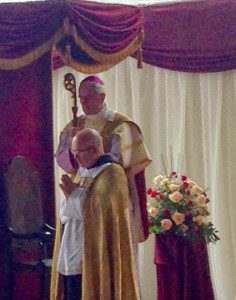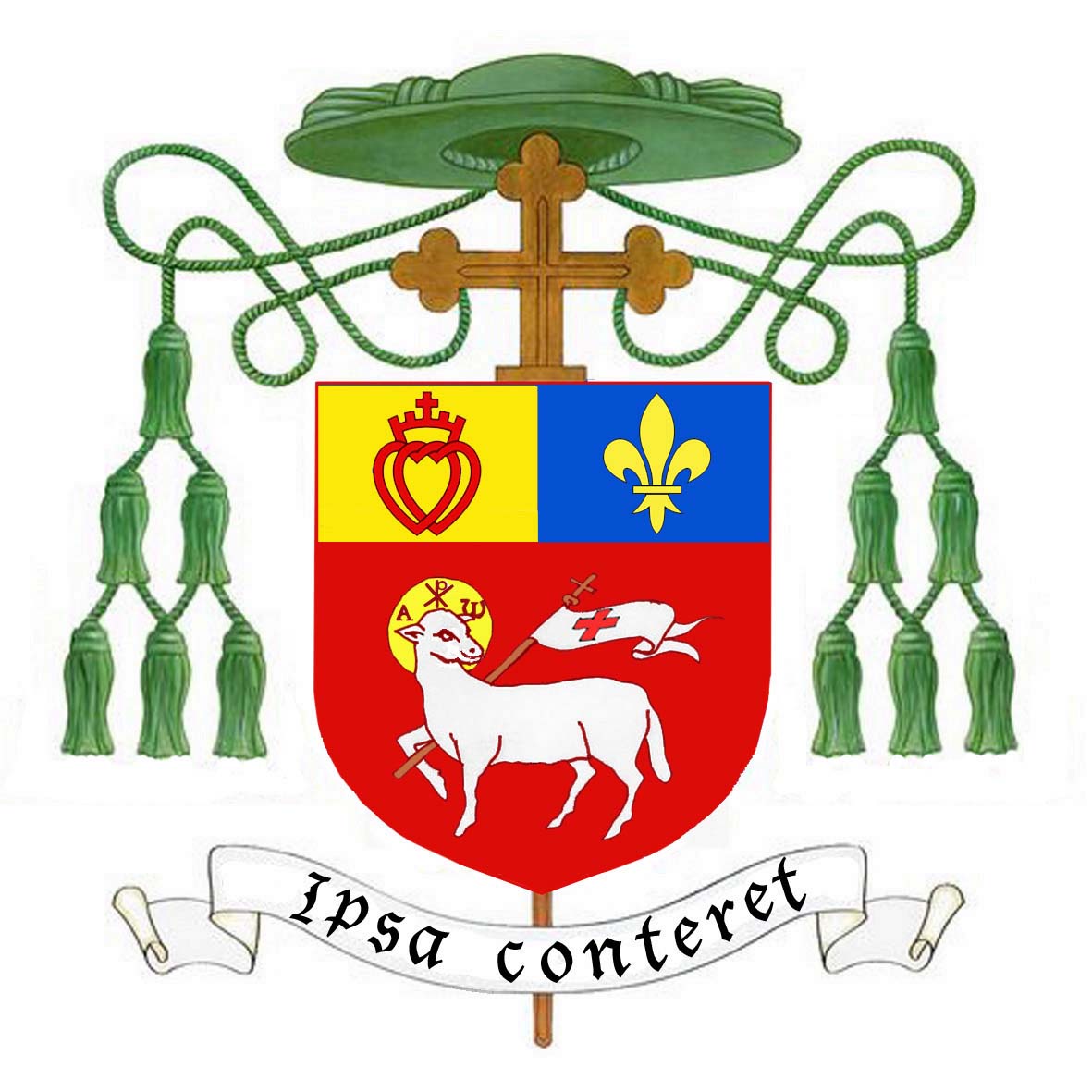Interview with Bishop Jean-Michel FAURE
March 25, 2015
Your Excellency, there are some who are asking what the reasons are that led to your consecration having been done with so much discretion. Â Wouldn’t it have been better to have given greater publicity to such a joyous event?
The consecration had to be done this way so as not to have been hindered. Bishop Williamson’s situation remains delicate. Â We chose this monastery because it is a little distant and provides certain measures of security. Â Moreover, there is adequate space here which makes it easy for liturgical ministers. Â Overall, there was a need to avoid any type of disturbance, and this was accomplished successfully.
Your Excellency, can you tell us anything about the signature of the 1988 protocol? Were you with Archbishop Lefebvre in those days?
I was not; instead, I was made aware of these facts just like any other member of the Society.  On the 5th of May of 1988, Archbishop Lefebvre signed a protocol for an agreement with Rome, in which the pope recognized the right to consecrate one of the SSPX priests a bishop.  At this time, it was considered to be something necessary in order for the work of Archbishop Lefebvre to survive after his death, but such a thing was also the bait and the hook to obtain the Archbishop’s signature.  I think that when Archbishop Lefebvre signed this document he had a moment (temporary indeed) of weakness, as was the case with Saint Joan of Arc, and like her, he wrote, after the “worst night of his lifeâ€, a retraction letter to the Vatican representative, by which he nullified the protocol. Bishop Fellay cannot take advantage of this moment of weakness which was later retracted to say he is imitating Archbishop Lefebvre’s conduct. “I went too farâ€, Archbishop Lefebvre would say later, referring to the signature of the protocol. Archbishop Lefebvre had no illusion about the Roman diplomacy and the Roman interlocutors, as is demonstrated in many of his declarations and in the non-diplomatic determination that appears in the fundamental declaration of 1974 about the two Romes: the Eternal and the modernist, or the two churches: the Catholic and the conciliar. And Bishop Fellay, in so far as he confuses the current, official, modernist Rome with the Eternal Rome, he makes himself unfaithful to Eternal Rome, guardian of the Truth. He confounds the conciliar church – about which Arch. Lefebvre spoke so much – with the Catholic Church. For Bp. Fellay there is only one church and only one Rome: but this is the antithesis of Arch. Lefebvre’s position.
Your Excellency, recently we have been able to read many criticisms about yourself. For sure, the devil is not very happy with this consecration. What could you tell us about this?
What happens is that we intend to continue as much as possible the line of Arch. Lefebvre, and for this reason we receive attacks from the right and from the left, just like it happened to Arch. Lefebvre.
From the right and from the left?
Yes. On the left are those that are carrying out the integration of the SSPX into the conciliar church, and on the right are the sedevacantists. Sedevacantism is an excessive simplification of the situation (and sometimes it is not exempt of sentimentalism, even though this may be understandable). That was not accepted, on a prudential level and after a deep examination, by Arch. Lefebvre and by theologians and canonists of high level that he was able to consult. On this, one must speak about the true grace of state in Arch. Lefebvre, who had to some degree the same role of Saint Athanasius against modernism. We have no doubt that Providence put him here to guide us in this crisis of the Church, that has only gotten worse after his death, but continues to be essentially the same. We cannot say that Francis has a greater responsibility than Paul VI or John Paul II for the development of the crisis that Arch. Lefebvre, Bp. De Castro Mayer, Fr. Calmel O.P. and so many other great theologians confronted.
On the other hand, Menzingen says that Your Excellency and Bp. Williamson do not  recognize the Roman authorities “except in a purely rhetorical mannerâ€. Â
No more and no less than Arch. Lefebvre. Hence the sedevacantists also attack us, and in a very violent way.
Your Excellency, in your Masses do you pray for Pope Francis?Â
I follow Arch. Lefebvre’s instructions about this matter: pray for the pope and denounce his heresies, like Saint Athanasius and so many saints who had to oppose the popes of their times.
Concerning these liberal and modernist popes, and the question of the Catholic Church vs.  the conciliar church, does Your Excellency agree with the position of the Dominicans of Avrillé, as exposed in the article titled: “One Pope for two Churchesâ€?Â
Yes.
Let us continue with the theme of the pope. In the previous interview we asked  Fr. Faure what would he do if Francis invited him to go to Vatican. And now we ask you as Bp. Faure, what would you say to Francis?
Above all I must say that such an interview is practically impossible, since a sine qua non condition is the presence of Bp. Williamson and the other priests, any type of “negotiation†already being excluded as seen as a deal of any sort, as Arch. Lefebvre used to say, so long as there is no radical conversion on the part of Rome, accepting, in fact and in right, all the encyclicals prior to Vatican II, as well as the condemnations against liberalism and modernism that they include;  but this apparently will not happen before the third world war (that seems near). I would say to the pope: “What Church do you belong to? To the Catholic Church or to a falsification of the Church?” His function is to confirm his brothers in the Faith. I would remind him of the words of Saint Paul: your authority was given to you “unto edification, and not unto destructionâ€(2 Cor. 13, 10), to edify and not to destroy catholic faith and morals. I would say to him the following, citing Arch. Lefebvre: “Do you agree with all the great encyclicals prior to John XXIII, and with all the popes up until and including Pius XII? Are you in ‘full communion’ with those popes and with their teachings? Do you accept the anti-modernist oath? Do you agree with the Social Reign of Our Lord Jesus Christ? If you do not accept the doctrine of these predecessors of yours, it’s useless to talk with you. It is because we are faithful to the Eternal Rome that we are obligated to separate ourselves from the modernist and liberal, current and official, Rome. Don’t think that just because Menzingen may let itself be seduced, that Bp. Williamson or I are going to fall for the same trap.”
Coming back to the critics and lies about yourself, some of them are extremely ridiculous. Therefore, forgive this question that we are asking with the purpose of honoring the truth and in order to protect some simple and excessively gullible souls: Can you tell us something about the circumstances of the burial of your father?Â
In March 3, 1986, my father’s body was taken to my home for the wake. There he was placed upon my bed, and not upon the floor, as the slanderous sedevacantists falsely claim. Let them say the names of the witnesses! Personally, I can name Fr. Canale SSPX, who celebrated the Requiem Mass, Fr. Ricardo Olmedo SSPX, and the seminary professors who knew the facts, the seminarians that today are priests, Fr. Schmidberger SSPX, who was in the Mass and in the cemetery, and also the members of Mesuda family, who were great benefactors of the seminary when it began and who were present at the wake ceremony. These ones later gathered in their field, moved by mercy, the twenty seminarians that left seminary during the sedevacantist rebellion of 1989. My father was buried in the little cemetery of the Society where his his tombstone was made visible after the mass attended to by all the seminarians and many priests and faithful. In this incident there was nothing abnormal and nothing to hide; but what we have here is an example of the sedevacantist logic to say Bp. Faure is Jew: I was born in Algeria; Jews are numerous in Algeria; therefore, “I must be a Jewâ€. But, as Muslims are much more numerous, maybe I am a marrano muslim? Against all these very ridiculous calumnies and fabrications, I have a very good genealogical tree of my family in France that I will make public when I go back there.
And what can you tell us about the crisis of the Argentinian seminary, in 1989? They also blame you for this.Â
About the crisis in the Buenos Aires seminary, I am making it clear that I arrived in Mexico in September 24th, 1985, five days after the terrible earthquake, after having been appointed Superior of the District of Mexico, but this crisis took place in 1989, in the period the sedevacantist rebellion against Arch. Lefebvre. The director, one professor and many priests of this tendency had influenced half of the seminarians of La Reja, that waited the visit of Fr. Schmidberger in 1989 to leave wholesale the seminary and get into a “seminary†made by a secular group in Mexico. A complete failure: a little group of them remained in an abandoned monastery near Cordoba, Argentina, and afterwards around Luján, and finally in El Bolsón (South of Argentina). Therefore, it is an evident lie that the supposed  scandal around the burying of my father, that happened three years before, had provoked the immediate departure of these twenty seminarians. Bp. Tissier writes about these facts in the biography of Arch. Lefebvre. (page 546, 2nd Ed., Edi. Clovis, 2002).
(Translation by Michael)


